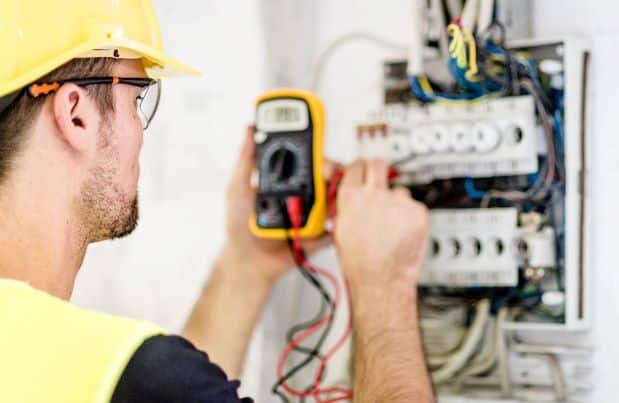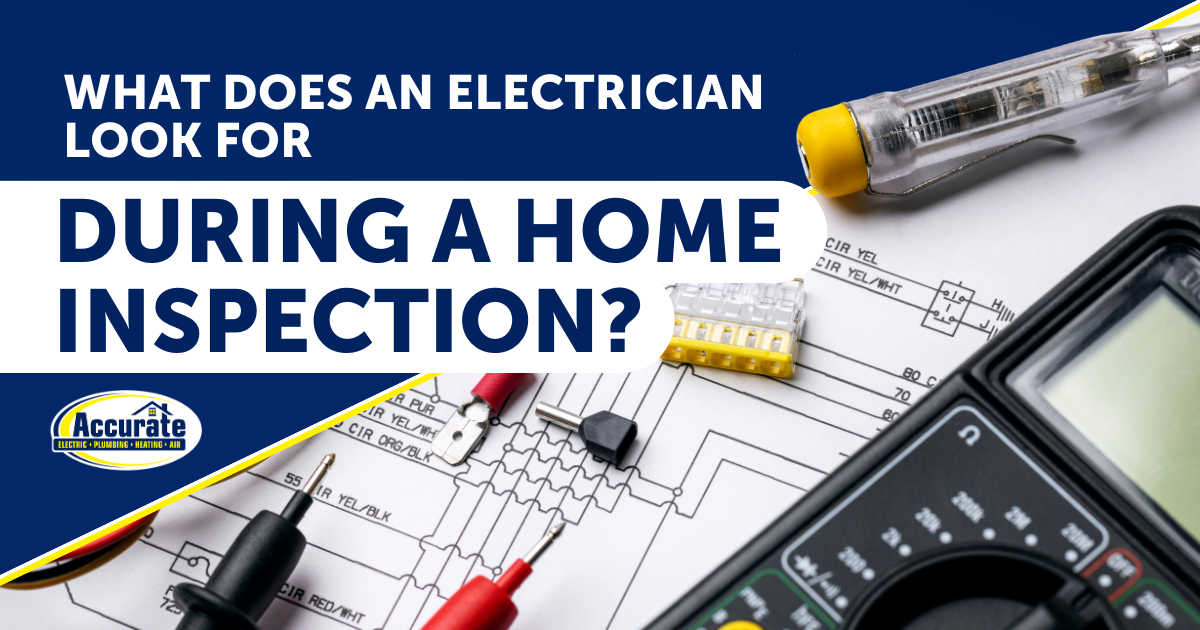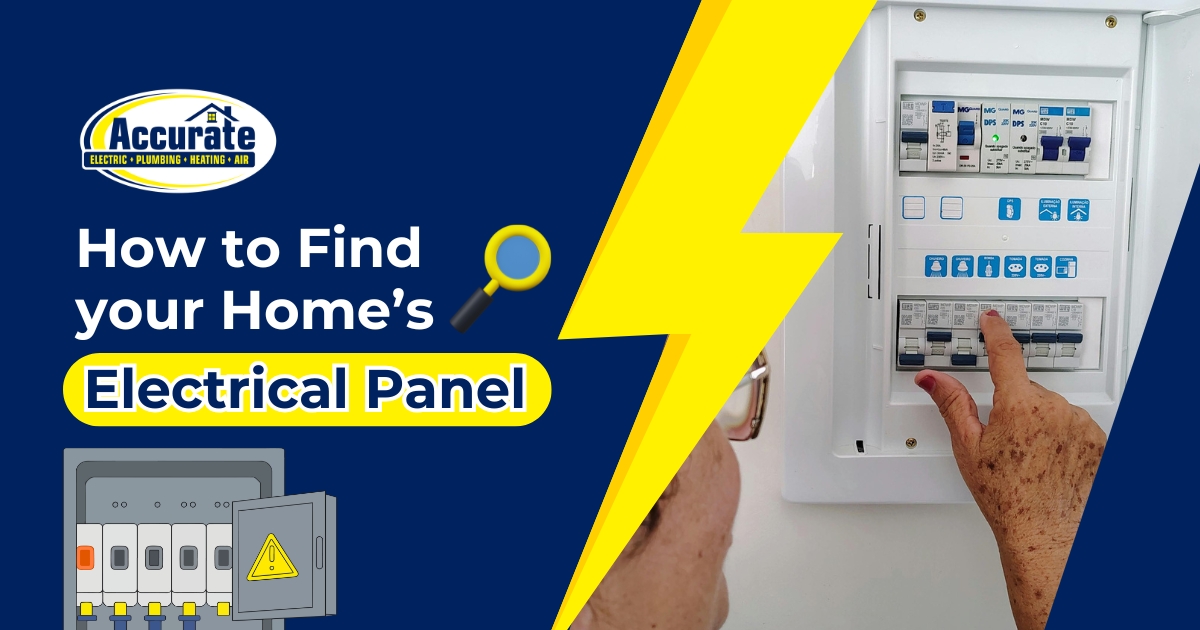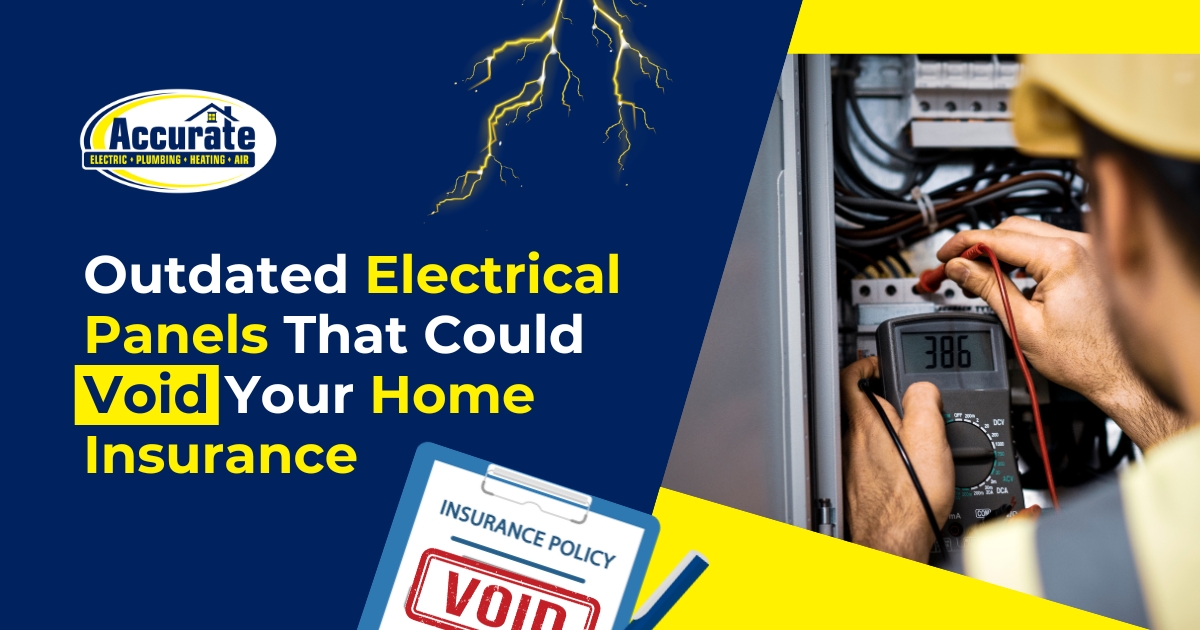What to Know
- Professional electrical home inspections from Accurate will detect hidden problems that lead to safety hazards like electrical fires or shocks.
- Our inspections cover everything in your electrical system, including: electrical wiring, meters, panels, appliances, and outlets.
- Accurate can handle all repairs and replacements for electrical systems.
- Common issues found during an inspection are outdated wiring and overloaded electrical panels.
Why an Electrical Home Inspection Matters
Your home’s electrical system is always working on a breaker circuit, out of sight and out of mind, and though something like a flickering light could seem minor, it could be the first sign of a serious safety hazard.
According to the City of San Diego, “electrical fires claim the lives of 500 Americans each year, injure 2,300 more and cause $1.5 billion in property damage.” Furthermore, one in seven home fires is an electrical fire. Faulty wiring, overloaded circuits, and other electrical system defects can be the source of these fires. Outside of electrical fires, faulty wiring could also be a hazard for electrocution, especially in places with water systems, like bathrooms or laundry rooms.
This is why your home needs routine electrical home safety checks from a certified electrician from Accurate. Discovering minor issues can also avoid extensive, costly electrical problems down the road, especially if you’re looking to purchase or sell a home.
What Does an Electrician Check During a Home Inspection?
Our electricians follow a tried-and-true electrical home inspection checklist. Knowing what is checked in an electrical inspection can help you better prepare for the inspection and understand what’s needed if repairs are required. Here is what Accurate checks during an electrical inspection:
- Electrical meter: Your electrical meter must properly track the amperes that you’re system is using in your Rancho Cucamonga home. An electrician will also check your meter for any kind of defects, like rust or wear and tear.
- Electrical panel: Your electrical panel is the command centre of all your home’s voltage systems. We will check for frayed or burned cables, proper connections, fire risks, and overall electrical capacity, especially if it has been upgraded recently.
- Wirings: We look for any knob and tube or aluminum wiring that may not support modern systems and determine if there is proper grounding.
- Outlets and GFCI: We test all outlets for correct power readings and ground tests to make sure there is no chance of accidental electrocution. We also test GFCI outlets to make sure the shut-off switches work as well as the reset buttons.
- Lighting systems: Any appliance on a circuit, like a ceiling fan or outdoor lighting, will be checked for proper wiring, connections and mounting.
How Long Does a Home Electrical Inspection Take?
Most residential electrical inspections take up to five hours, depending on the size of the home and the complexity of the electrical systems with multiple panels. Smaller homes can take only two hours, while larger homes with newer renovations can add time.
A home electrical safety inspection takes time to be completed properly, meaning our Accurate electricians will never rush a job and overlook a minor problem.
What Electrical Issues Are Most Commonly Found in Homes?
The most common electrical issues during a home inspection are usually outdated wiring and overloaded electrical panels. If your home is old, chances are its electrical system is also old as well. Knob and tube wiring is a common occurrence with homes designed in the 20th century, and it just can’t handle today’s electrical demands, which could result in a shock or fire hazard. DIY wiring with incorrect connections is also common in older homes.
Sometimes an electrical panel needs to be upgraded with safety devices to support a newer appliance’s power demands.
Another issue comes from GFCI outlet protection. GFCIs, which are fail-safes that protect from electrical shock, are required in California in areas like bathrooms, kitchens, and garages, but many older homes will lack this protection. Luckily, these are easily installed systems with a professional electrician.
Do I Need an Electrical Inspection Before Buying or Selling a House?
Real estate contracts usually only require a basic home inspection in California, but having an electrical inspection before a home purchase from Accurate protects both the buyer and seller. For buyers, having an electrician inspection before buying a house may help discover electrical issues early on, giving you negotiating power on the home’s value while planning for any repairs. For sellers, having a thorough electrical inspection early shows the buyer you have done your due diligence and protects you from unwanted, surprise costs, while also avoiding any repair delays.
Benefits of Booking an Electrical Inspection with Accurate Electric Plumbing Heating & Air
At Accurate, we bring years of experience and expertise to our electrical home inspections. We’ve seen all electrical issues, from shoddy, rushed DIY wiring to improperly installed electrical panel upgrades. Below is what you can expect from one of our electrical inspections:

- Access to special deals and coupons to allocate costs.
- Detailed written reports about what we found during inspection, as well as our recommendations for repairs.
- Quick and painless repairs, if needed.
Service Area – Electrical Inspections Near You
We cover electrical inspections for areas in Southern California, including Rancho Cucamonga, Glendora, and Claremont. We are always looking to expand our reach and work with older and newer properties.
Better Safe Than Sorry: Schedule Your Home Electrical Inspection Today
Whether you’re looking to sell your home or upgrade its electrical system to modern standards, Accurate has got you covered. Don’t wait for signs of failure, like flickering lights, burn marks, or tripped breakers, and schedule your professional home electrical inspection today.
Frequently Asked Questions
How can I tell if my home’s wiring is outdated?
Learn the age of your home, and if it was built during the early to mid-20th century, chances are it has outdated knob and tube wiring. If you notice frequent breaker trips, this is also another indicator.
Does a home inspection include checking smoke detectors and GFCI outlets?
Yes. GFCI outlets are required for California building codes, as well as smoke detectors. An electrician will do a safety check and determine if both are working properly.
What happens if the electrician finds faulty wiring during an inspection?
The electrician will make a note of it and recommend the best course of action. Obviously, the decision for repairs is up to the homeowner, but if you are, say, selling a home, some real estate contracts will require the wiring to be fixed before the sale.
Can an electrician check for overloaded circuits?
Yes, and this is one of the most common things we find during an electrical home inspection. Most people will add a new appliance to the same breaker, and if it is outdated, it will constantly trip.
How often should I have my home’s electrical system inspected?
We recommend electrical inspections every 10 years for newer homes and every five years for homes over 25 years old. However, if you notice any warning signs or plan major electrical additions, schedule an inspection sooner.






